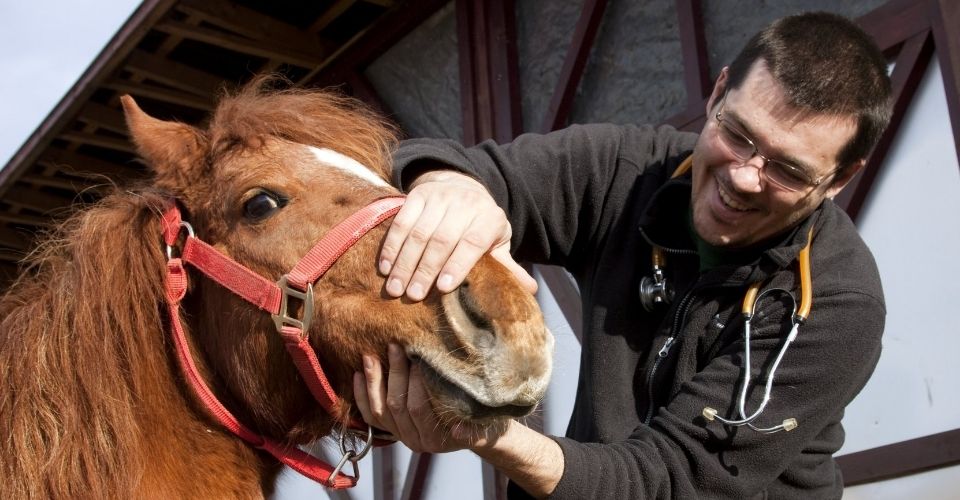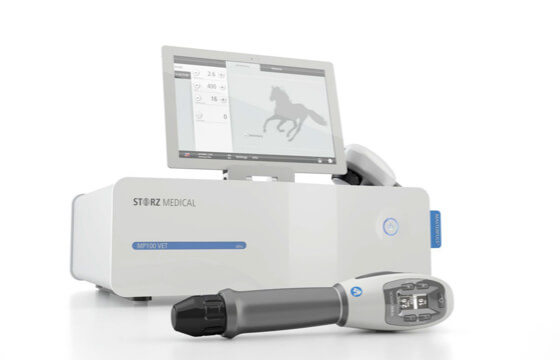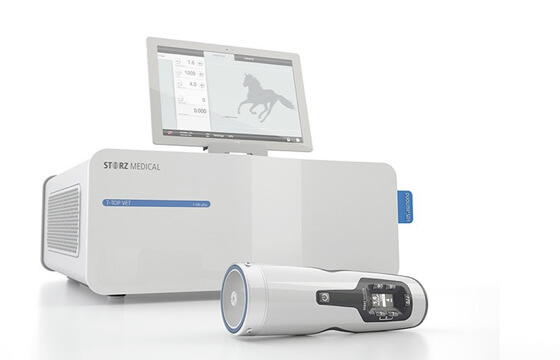The first clinical study on the effectiveness of extracorporeal shockwave therapy on animals in 1992 investigated bone fracture recovery in rats. The study was successful, and showed that the fractures healed faster after five shockwave sessions. Since then, countless studies have been published on shockwave therapy in both animals and humans, and shockwave therapy is now one of the most common treatments in the UK for a wide range of musculoskeletal conditions, with shockwave devices present in most hospitals and physiotherapy clinics.
Shockwave therapy involves passing short, intense sound waves into damaged tissues, which increases blood flow, has an analgesic effect and stimulates the repair and regeneration process. The treatment puts the cells into repair mode and allows the body to restart its own accelerated healing process.

How is shockwave therapy used on horses?
Just as with human patients, there is growing demand for non-surgical and drug-free treatments that carry no risk when compared to invasive surgery, or side effects when compared to medicines and other therapies.
In horses, shockwave therapy can be used to treat:
Digital flexor tendonitis
Proximal suspensory desmitis
Suspensory branch desmitis
Arthritis of the spine
Kissing spines
Splint exostosis
Decrease lameness associated with navicular syndrome
Sesamoiditis and sesamoid fractures
Angular limb deformity in young growing foals
Insertional desmopathy
Tendinopathy
Osteoarthritis
- Fissures, stress fractures, osteolysis
Ligament injuries
Degenerative suspensory ligament desmitis (DSLD)
Wound healing
Treating MSK injuries in horses can be a tricky process, mostly because injuries can’t be treated in the same way we would treat a human’s. Whereas a human can take weight off an injury with crutches, a sling, or a back or neck brace, horses must go back to supporting their own 500kg weight within a day of treatment. This means that to prevent further and potentially irreparable damage, the horse’s injury needs to heal as quickly as possible. Shockwave therapy won’t heal injuries within a day, but it will typically reduce healing times and promote repair within a few weeks (depending on the type and severity of the condition).
What type of shockwave therapy machine would be best for my veterinary clinic?
At Venn Healthcare we supply two Storz medical shockwave therapy machines for use in veterinary clinics. Storz medical is the industry leader in shockwave devices and we provide full education and aftercare services for shockwave devices.
There are two types of shockwaves, radial and focused. Radial shockwaves (or radial pressure waves) have their highest energy point at the source, and the shockwaves travel through the skin and weaken the farther they travel, but treat a larger area at once.
Focused shockwaves can have a varied focal point, meaning their highest energy point is usually at the targeted treatment area. For more information on this, you can read our article on the difference between focused and radial shockwave devices.
MASTERPULS® MP100 VET ULTRA
The MP100 Vet Ultra is the veterinary edition of Storz Medical’s “Masterpuls” radial shockwave therapy line.
This device has a compact size, excellent reliability, low servicing costs and an extremely silent built-in Air Power drive, which is particularly handy when treating nervous horses. The machine can also be fully controlled from the handpiece, meaning the user does not have to move away from the animal during treatment.
The size and weight of the MP100 Vet Ultra (426 x 144 x 340mm / 10.5kg) means it can be easily transported between stables or equine centers in a handy travel bag included with purchase.
The device has therapeutic effectiveness up to 50mm penetration depth and only takes one minute to set up.
DUOLITH SD1 T-TOP VET ULTRA
The SD1 T-Top Vet Ultra is the veterinary edition of Storz Medical’s Duolith focused shockwave therapy line.
As the device emits focused shockwaves, it can focus its energy anywhere between 0-65mm, and provide therapeutic effectiveness up to 125mm penetration depth, making it perfect for treating deep tissue injuries and large horses.
Although the SD1 T-Top Vet Ultra is a heavier device (466 x 187 x 454mm / 24kg), it comes with a hard travel case and separate case for the handpiece and accessories. Like with the MP100 Vet Ultra, the machine can be controlled directly from the handpiece.






